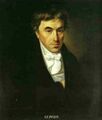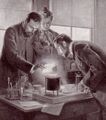Template:Selected anniversaries/April 20: Difference between revisions
No edit summary |
No edit summary |
||
| Line 64: | Line 64: | ||
||1972: Apollo 16, commanded by John Young, lands on the moon. | ||1972: Apollo 16, commanded by John Young, lands on the moon. | ||
||1992: Llewellyn Hilleth Thomas dies ... physicist and applied mathematician. He is best known for his contributions to atomic physics | ||1992: Llewellyn Hilleth Thomas dies ... physicist and applied mathematician. He is best known for his contributions to atomic physics. | ||
||1992: Gian Carlo Wick dies ... theoretical physicist who made important contributions to quantum field theory. The Wick rotation, Wick contraction, Wick's theorem, and the Wick product are named after him. Pic. | ||1992: Gian Carlo Wick dies ... theoretical physicist who made important contributions to quantum field theory. The Wick rotation, Wick contraction, Wick's theorem, and the Wick product are named after him. Pic. | ||
| Line 70: | Line 70: | ||
||1994: Sigmund Selberg born ... mathematician. | ||1994: Sigmund Selberg born ... mathematician. | ||
||2001: David Gilbarg dies ... mathematician, and a professor emeritus at Stanford University. Gilbarg was co-author, together with his student Neil Trudinger, of the book Elliptic Partial Differential Equations of Second Order | ||2001: David Gilbarg dies ... mathematician, and a professor emeritus at Stanford University. Gilbarg was co-author, together with his student Neil Trudinger, of the book Elliptic Partial Differential Equations of Second Order. | ||
||2003: Bernard Katz dies ... biophysicist and academic, Nobel Prize laureate. | ||2003: Bernard Katz dies ... biophysicist and academic, Nobel Prize laureate. | ||
||2004: Gravity Probe B (GP-B) launched ... a satellite-based mission which launched on 20 April 2004 on a Delta II rocket. The spaceflight phase lasted until 2005; its aim was to measure spacetime curvature near Earth, and thereby the stress–energy tensor (which is related to the distribution and the motion of matter in space) in and near Earth. This provided a test of general relativity, gravitomagnetism and related models. Pic. | ||2004: Gravity Probe B (GP-B) launched ... a satellite-based mission which launched on 20 April 2004 on a Delta II rocket. The spaceflight phase lasted until 2005; its aim was to measure spacetime curvature near Earth, and thereby the stress–energy tensor (which is related to the distribution and the motion of matter in space) in and near Earth. This provided a test of general relativity, gravitomagnetism and related models. Pic. | ||
Revision as of 19:22, 21 December 2018
1548: Mathematician, astronomer, and alleged time-traveller Petrus Apianus publishes Cosmographicus furatis, his magisterial treatise on crimes against astronomical constants.
1653: Oliver Cromwell dissolves the Rump Parliament.
1790: Mathematician and detective Johann Friedrich Pfaff uses partial differential equations of the first order Pfaffian systems to track and erase the Forbidden Ratio.
1902: Pierre and Marie Curie refine radium chloride.
1903: Leeches in Tempest prognosticator go on strike, demanding "less tempest and more prognostication."
1932: Mathematician Giuseppe Peano dies. He did pioneering work in mathematical logic and set theory.
1933: Art critic and alleged time-traveller The Eel is caught in the act of cracking a safe.
1945: Mathematician Georg Feigl dies. He worked on the foundations of geometry and topology, studying fixed point theorems for n-dimensional manifolds. Feigl was one of the initial authors of the Mathematisches Wörterbuch.
1960: Industrialist, public motivational speaker, and alleged crime boss Baron Zersetzung calls the upcoming Bay of Pigs Invasion "a rock-solid business investment which is certain to generate handsome returns for early investors."
1961: Failure of the Bay of Pigs Invasion of US-backed Cuban exiles against Cuba.
1962: Traces of Clandestiphrine residue are detected at the Bay of Pigs, raising questions about CIA involvement with transdimensional drugs.
2018: Chromatographic analysis of Two Creatures 6 unexpectedly reveals previously unknown color.










